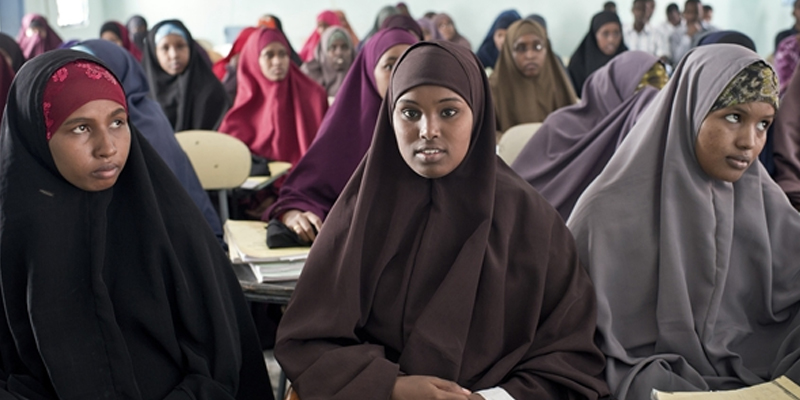
It is hard being a woman all over the world but it is much more harder in some regions, especially in Africa. Somali women have been facing some hardships just like other women in the continent of Africa.
World Bulletin / News Desk | Art & Culture | 29 December 2017 Friday –
As known, Somalia is an East African country with a Sunni Islamic background. Somali society adopts a settled lifestyle besides having a nomadic culture. In this direction, it is a community displaying settled and nomadic cultures together. Despite all the negativities in the country, it is possible to trace the social and cultural life such as pre-marriage rituals, bridewealth, dowry, wedding ceremony, birth, circumcision, and divorce.
How do the Somali people who fled to other countries during the war get married? What the bride want as the bridewealth from her husband-to-be? Is there a time difference between the marriage contract and ceremony? Is there a tradition that couples called engagement are like each other’s recognition process? Is there any cost to the family of the bride for the dowry? How does the wedding ceremony take place? How did the tradition of circumcising women come into being? In which situations do couples choose to divorce?
Primarily, young Somali women marry mostly when they are between 12 and 19. Husbands are usually older than wives. Sometimes Somali girls can be the second wife of their husbands. The tribes called the clan are very important for the people of Somalia. They can not marry a person from the upper class or lower class. Similarly, the members of the clan in the lower class can marry only one of their own group.

Weddings in Somalia
Spouses never see each other before the wedding if they are not relatives or neighbor. There is no such thing as a relationship between couples called engagement. On the first day they get married in the presence of witnesses and in front of the shaykh; just like the religious wedding in Turkish culture. After the marriage contract husband and wife declare their marriage.
During the period between the marriage contract and wedding ceremony, which is about one month, spouses try to know each other closely. In the meantime, if they want to do so, they keep a house close to the father’s house, but some of the tribe’s members are separated from the father’s house only by the father’s death. One month later, the bride wears a white wedding dress. During the wedding, the boy’s side sends various gifts to the girl’s side. As a result of the negotiations under the title of dowry money, 15 camels, in some cases up to 100 camels, and some other gifts are sent to the girl’s side.
One week after the wedding, the bride is dressed in traditional Somali clothing and entertainment is organized, of course, among women. After this wedding tradition, gifts prepared for the boy’s side are presented. The girl’s side presents including the meat, ginger, palm, fragrance and dress in an embellished chest. Also, the bridewealth is given to the bride, which an Islamic assurance for the bride. However, there are some cases in which Somali men do not give the promised bridewealth. For instance they decide 4 camels to be given but men give only 2 camels to their wives or sometimes the men refuse to give anything; whereas in some cases men keept their words and give the bridewealth immediately.
Family institution in Somalia
On the other hand, a husband never helps his wife in housework. because it is a shame in the society to help your wife while she is doing the housework. If the spouses have children, they, who are the ones given the name for their children, can agree upon the name among themselves. However, sometimes husbands dominate and give the children officially the name they want. Provided that the mother doesn’t like the name her husband gave, she gives the child a name she likes and calls the child with that name. Because it is seen a right of the mother, since she is the one who has spent a lot of time with the child. This, of course, causes some confusion, and the child who is accustomed to the name given by his mother gets confused when he is addressed with his official name.
Another issue fort he Somali women is the circumcision tradition. It is possible to say that the tradition of circumcision is still continuing, although this incident seriously harms women. But it is also clear that circumcised women in the past do not want to circumcise their daughters. The tradition of circumcising women came to them from Egypt, as the Somali women say. They seem to be suffering when they remember that moment.
The fact that Somali men have third or fourth husbands is not something that Somalian women enjoy very well; but they do not say anything because it is a religious tradition. Yet many jealousy incidents occur. For example, the second wife appears to be lucky; the first wife gets jealous, even if she is next to her husband from the beginning, and convinces her husband to marry for the third time. The purpose here is that the second wife would feel the exact thing and get anxious.
But there are some good intentions as well; sometimes it is known that these four spouses have a friendly affair with each other and that they divide the housework among themselves under the head of the first wife. The reason for this is that the justice among your husband’s wives. But the new generation does not accept being the second wife and does not allow her husband.
So, what happens if a girl did not accept to marry someone proposed to her? The young girl, unfortunately, has to accept the proposal because of the conflict and war in the country, and if the man proposing was rich, then the young girl is never asked to accept the proposal or not; they immediately get married off. In some cases, girls don’t accept forced marriage and prefer to leave the homeland instead of getting married.
Divorces
Nowadays divorce in Somali society is common and due to the simple reasons couples got divorced. Earlier divorce was being treated as a shame in the Somali society, and the fact that the state barely exists because of the civil war has triggered divorce. Before the civil war, the state took various precautions against the corruption of the family, which is the core of the society; and prevented the couples from getting divorced. Previously widow woman were not preferred to be married in the first place; however, they are now preferred since seen as experienced. Moreover, although earlier widow woman could not get any bridewealth, things have changed. Now they can take the bridewealth and get married with a wedding ceremony.
The reasons for getting divorced are quite simple. For example, lack of interest can be a reason for getting divorced. Or sometimes a husband, who doesn’t want to be a father, refuses his child and pregrant wife. A man living abroad wants to stay there and in the case his wife wants to return to Somalia they get divorced.
These women do not have the right to inherit
What do a woman do who is divorced or whose husband died? The Somali women lack the rights given to them by Islam. Because these women do not have the right to inherit. In the culture of a non-nomadic Somali society, the Somali woman whose husband died can not take the advantage of her deceased husband’s land. Brothers of the deceased husband come into the land instead of the wife. If the brothers allow widows and nephews to benefit from the land, then the wife and children of the deceased husband work as labourer in the land. Otherwise, the woman will settle near her brother and start to work in her brother’s house.
When the boy grows up, they leave this house and the woman get married for the second or third time. If she does not get married, she uses his son as an intermediary to sell her handmade products. In any case, the woman is still dependent on her father, husband, brother or son. When it comes to the divorced woman’s ex-husband, he doesn’t even inquire after his ex-wife and children until the age of maturity. After a certain age, especially when a child arrives at the age of 10 or 15, the father calls for his ex-wife, and if she is abroad he cares for their children, provides their education and also sends a certain amount of money to the ex-wife. Although women try to stand on her own feet during this time, they sustain her life depending on the men. So the fact is that it is totally dependent on the men’s conscience.
After all, being a woman, especially being a Somali woman is really hard. The women challenged every difficulty are left to sustain their life on their own. Women, who can not even benefit from the rights that Islam has given them, continue their lives among the traditions and religious conflicts that are adopted as cultures. In fact, we should be highlighted that if there is stability, order and moral rules dominate in society. Just as the family is the building block of the society, the state is like a wall that surrounds and protects the family, like a roof.
.
.
.
Xafiiska Wararka Qaranimo Online | Muqdisho
__________________________________________________
_____________________________________________________________________________________
Xafiiska Wararka Qaranimo Online | Mogadishu, Somalia
_____________________________________________________________________________________Advertisement
_____________________________________________________________________________________







